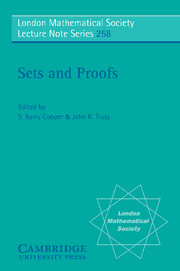Book contents
- Frontmatter
- Contents
- Preface
- An Introduction To Finitary Analyses Of Proof Figures
- What Mathematical Truth Could Not Be – II
- Proof Search in Constructive Logics
- David's Trick
- A Semantical Calculus for Intuitionistic Propositional Logic
- An Iteration Model Violating the Singular Cardinals Hypothesis
- An Introduction to Core Model Theory
- Games of Countable Length
- On the Complexity of the Propositional Calculus
- The Realm of Orinal Analysis
- Covering Properties of Core Models
- Ordinal Systems
- Polish Group Topologies
- Forcing Closed Unbounded Subsets of Nw+1
- First Steps into Metapredicativity in Explicit Mathematics
- What Makes A (Pointwise) Subrecursive Hierarchy Slow Growing?
- Minimality Arguments for Infinite Time Turing Degrees
The Realm of Orinal Analysis
Published online by Cambridge University Press: 05 September 2013
- Frontmatter
- Contents
- Preface
- An Introduction To Finitary Analyses Of Proof Figures
- What Mathematical Truth Could Not Be – II
- Proof Search in Constructive Logics
- David's Trick
- A Semantical Calculus for Intuitionistic Propositional Logic
- An Iteration Model Violating the Singular Cardinals Hypothesis
- An Introduction to Core Model Theory
- Games of Countable Length
- On the Complexity of the Propositional Calculus
- The Realm of Orinal Analysis
- Covering Properties of Core Models
- Ordinal Systems
- Polish Group Topologies
- Forcing Closed Unbounded Subsets of Nw+1
- First Steps into Metapredicativity in Explicit Mathematics
- What Makes A (Pointwise) Subrecursive Hierarchy Slow Growing?
- Minimality Arguments for Infinite Time Turing Degrees
Summary
Denn die Pioniere der Mathematik hatten sich von gewissen Grundlagen brauchbare Vorstellungen gemacht, aus denen sich Schlüsse, Rechnungsarten, Resultate ergaben, deren bemächtigten sich die Physiker, um neue Ergebnisse zu erhalten, und endlich kamen die Techniker, nahmen oft bloß die Resultate, setzten neue Rechnungen darauf und es entstanden Maschinen. Und plötzlich, nachdem alles in schönste Existenz gebracht war, kamen die Mathematiker – jene, die ganz innen herumgrübeln, – darauf, daß etwas in den Grundlagen der ganzen Sache absolut nicht in Ordnung zu bringen sei; tatsächlich, sie sahen zuunterst nach und fanden, daß das ganze Gebäude in der Luft stehe. Aber die Maschinen liefen! Man muß daraufhin annehmen, daß unser Dasein bleicher Spuk ist; wir leben es, aber eigentlich nur auf Grund eines Irrtums, ohne den es nicht entstanden wäre.
ROBERT MUSIL: Der mathematische Mensch (1913)Introduction
A central theme running through all the main areas of Mathematical Logic is the classification of sets, functions or theories, by means of transfinite hierarchies whose ordinal levels measure their ‘rank’ or ‘complexity’ in some sense appropriate to the underlying context. In Proof Theory this is manifest in the assignment of ‘proof theoretic ordinals’ to theories, gauging their ‘consistency strength’ and ‘computational power’. Ordinal-theoretic proof theory came into existence in 1936, springing forth from Gentzen's head in the course of his consistency proof of arithmetic. To put it roughly, ordinal analyses attach ordinals in a given representation system to formal theories.
- Type
- Chapter
- Information
- Sets and Proofs , pp. 219 - 280Publisher: Cambridge University PressPrint publication year: 1999
- 38
- Cited by

